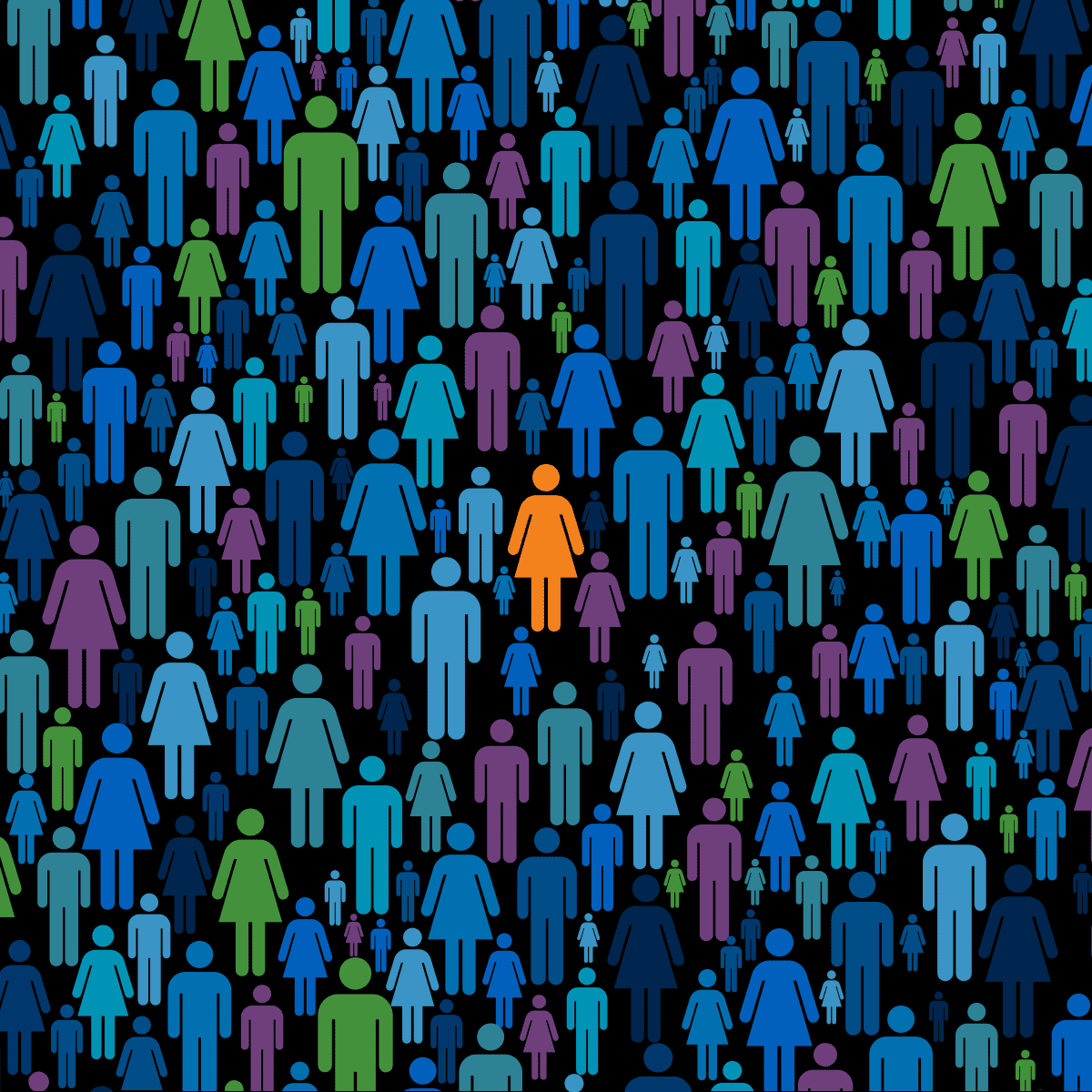Are you one of the rare ones?

This Is the Rarest Personality Type in the World

Do you ever feel like no one really gets you? Like you’re seeing the world in IMAX while everyone else is stuck watching VHS tapes? Maybe you feel subtle mood shifts before people even realize they’re having feelings, crave soul-level conversations and overanalyze every interaction—not because you’re dramatic (OK, maybe a little), but because you genuinely pick up on things most people miss. If this sounds suspiciously like your inner monologue, congratulations: You might be part of a very small psychological club—the rarest personality type of all.
According to the massively popular Myers-Briggs Type Indicator (MBTI), there are 16 personality types, and the rarest one makes up less than 2% of the population. These elusive humans are idealistic, empathetic and strategic, with a sixth sense for truth and emotion, and weirdly, they often know where the plot twist is going before the movie even starts.
“This personality type is unique and comes with its own strengths and challenges,” explains Viviana McGovern, LMFT, a licensed therapist, personality expert and card-carrying member of this personality type. “For instance, I tend to feel and think about things very deeply, but this means I carry a lot of internal stress.”
Starting to sound like your brain on a random Wednesday morning? You may be this personality type too. And whether you’re trying to figure out how your personality affects your life or are just interested in this group, read on to see what the rarest personality type is—and why the world definitely needs more of them.
Get Reader’s Digest’s Read Up newsletter for more etiquette, humor, cleaning, travel, tech and fun facts all week long.
What is the rarest personality type?
Of all 16 MBTI personality types, INFJ—short for Introverted, Intuitive, Feeling and Judging—is the least common. INFJs are intuitive introverts who lead with empathy and seek purpose in everything they do.
“INFJ is the rarest for good reason, it’s an unusual blend of idealism and strategy, empathy and analysis,” says McGovern, the founder of Full Vida Therapy.
Personality researcher Daren Banarsë, a senior psychotherapist and former lecturer at the University of London, adds that it’s rare because INFJ brains process the world differently. “Having an INFJ personality means operating from a unique cognitive blueprint. Your dominant function is Introverted Intuition,” he says. “Essentially, you’re constantly scanning for patterns, meanings and future possibilities beneath the surface.”
This is why it seems to many INFJs like they just know things without being able to explain how—which can be both a blessing and a bit confusing, especially in group environments, he adds.
What is the INFJ personality type?
INFJs are commonly known as “The Counselors” or, in MBTI-speak, “The Advocates.” They blend deep thinking with profound empathy. These are the people who’ll give you life-changing advice in the car ride home after a party—and then go sit alone in their room to recharge for three days.
“INFJs are incredibly attuned to the emotions of others, often noticing what isn’t being said,” McGovern explains. “They care intensely about meaning and integrity.”
Banarsë agrees: “The real strength here lies in the INFJ’s ability to see potential in people and situations that others miss entirely. They’re natural synthesizers who can hold paradoxes and complexity without needing everything to be black-and-white.”
How do you know if you are an INFJ?

Wondering if you might be a member of this rare personality type clan? See if any of these align with your personality. (Note: This is just a fun little quiz based on tips from our experts. For an accurate personality analysis, you should take the full MBTI.)
-
You’ve been called an “old soul” since childhood.
-
You love people … but you need a lot of alone time. After a deep conversation, you need a solid 48 hours to recover.
-
You’re the go-to person for emotional advice. Everyone confides in you, even strangers at the grocery store.
-
You can sense when something’s “off,” even if no one says anything. You can feel it immediately when the mood in a person or a room changes.
-
You struggle to articulate your own needs. You’re so focused on helping others, you sometimes forget yourself.
-
You’re a perfectionist with high ideals. You want things to be meaningful—not just good enough.
-
You’ve ended a relationship that seemed “fine” to everyone else. Because inside, it hadn’t been fine for a long time.
What does it mean to have the INFJ personality type?
At their best, INFJs are insightful, nurturing, creative and quietly powerful. But that depth can also come with pitfalls. “Like me, other INFJs are prone to overthinking, emotional exhaustion and internalizing stress,” McGovern says. “We often feel misunderstood or out of place, especially in fast-paced environments or ones that feel superficial.”
But the INFJ’s perfectionism isn’t just about high standards, it’s about holding an idealized vision of how things could be, which rarely matches reality, Banarsë adds. INFJs also tend to absorb other people’s emotions, sometimes blurring the line between where they end and others begin.
Which famous people have the INFJ personality type?
Who are some INFJ famous people? Well, former First Lady Eleanor Roosevelt had the rarest personality type, as did former president Jimmy Carter. Lawyer and activist Mohandas Gandhi was also an INFJ. On the more artistic side of INFJ famous people, you’ll find Wuthering Heights author Emily Brontë, Crime and Punishment author Fyodor Dostoyevsky and Oscar-winning actress Shirley MacLaine.
How do INFJ traits show up in real life?
Have you ever been told you are an “old soul”? “It’s not uncommon for INFJs to be told they are old souls who are wise beyond their years,” McGovern says. “They’re typically the ones people turn to for comfort or clarity.” So what does this look like in their day-to-day lives?
In relationships
INFJs crave depth and emotional intimacy. This makes them very loyal and devoted partners, as long as they feel safe, McGovern says. “But if they feel emotionally unsupported, they can retreat inward.”
Their drive for depth means that they’re not here for casual chitchat, they want to know your soul. “They’ll invest enormous energy into understanding their partner’s inner world,” Banarsë says. But this energy comes with a downside: They tend to idealize their partners and avoid conflict to preserve harmony. Then they will later end the relationship abruptly after months of quiet inner processing, he says, which can take partners by surprise.
In careers
For them, meaning is everything. “INFJs can’t compartmentalize—if their work doesn’t reflect their values, they’ll experience real distress, regardless of salary or prestige,” Banarsë says. McGovern notes that INFJs thrive in roles that combine insight and impact, like therapists, writers, educators, social justice advocates and nonprofit leaders.
As parents
Because INFJs are so deeply nurturing and emotionally attuned, they are often really engaged parents. But their vision for who their children could become can unintentionally put pressure on kids. “They may struggle with boundaries,” Banarsë explains, “because they overidentify with their child’s distress. The key is learning that loving someone doesn’t mean shielding them from discomfort.”
In health
INFJs are extra vulnerable to stress, especially when they feel their values are compromised. “Their entire system protests when they’re out of alignment with their values,” Banarsë says.
Because they tend to internalize everything (feelings, expectations, the state of the planet), their bodies often pay the price. It’s not uncommon for INFJs to experience tension headaches, digestive issues or mysterious aches with no clear cause—just a backlog of unprocessed emotional weight.
“They may appear calm while quietly battling anxiety, insomnia or burnout,” McGovern says.
Another issue? “They’re so used to showing up strong for others that they often delay seeking help for themselves,” McGovern adds. This means that rest, alone time and creative expression are non-negotiable for INFJs to function well—but ironically, they’re also the things INFJs feel guilty prioritizing.
Making decisions
Their decision-making process isn’t easy for most personality types, but for INFJs, it’s extra complex. McGovern says this is an issue for her: “I often ‘just know’ what’s right based on my intuition, but I can get stuck in thought loops of ‘what if’ and self-doubt, especially when what I’m feeling seems to clash with logic.”
INFJs don’t make choices lightly, Banarsë says. They need their gut instincts, personal values and logical reasoning to all be on the same page before they feel good about moving forward. If even one of those pieces is out of sync, they can spiral into analysis paralysis, second-guessing themselves for days (or weeks), he explains. But when everything does click into place? They can make bold, clear decisions with laser-sharp confidence.
So just how rare is the INFJ?
INFJs make up about 1.5% of the general population, according to the 16 Personalities study—and the vast majority are women. Their scarcity is part of what gives them that elusive, “mystical friend you can talk to for hours” vibe. But being rare doesn’t mean being fragile.
“The most crucial insight for INFJs, in my opinion, is learning that their sensitivity isn’t a weakness,” says Banarsë, “but a sophisticated information processing system that requires conscious management.” In other words, INFJs aren’t broken—they’re wired differently, and that’s a strength worth protecting.
What other Myers-Briggs personality types are rare?
Not everyone fits into the INFJ mold, and that’s okay—rarity comes in many forms. Other uncommon MBTI types include:
-
INTJ (“The Architect”): Strategic, logical and independent. About 2% to 3% of the population.
-
ENFJ (“The Protagonist”): Inspiring leaders who balance charisma and emotional intelligence. Around 2% to 5%.
-
ENTP (“The Debater”): Energetic innovators who love exploring big ideas. About 2% to 5%.
Additional reporting by Morgan Cutolo.
About the experts
|
Why trust us
At Reader’s Digest, we’re committed to producing high-quality content by writers with expertise and experience in their field in consultation with relevant, qualified experts. We rely on reputable primary sources, including government and professional organizations and academic institutions as well as our writers’ personal experiences where appropriate. We verify all facts and data, back them with credible sourcing and revisit them over time to ensure they remain accurate and up to date. Read more about our team, our contributors and our editorial policies.
Sources:
- Viviana McGovern, LMFT, licensed therapist and founder of Full Vida Therapy; phone interview, June 1, 2025
- Daren Banarsë, BACP, senior psychotherapist, personality researcher and former lecturer at the University of London; email interview, May 31, 2025
- 16 Personalities: “INFJ”
- MBTI: “What is the least common Myers-Briggs personality type?”






















